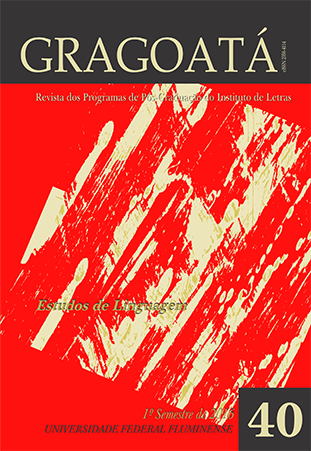‘CRY ME A RIVER’: METAPHORIC HYPERBOLES IN THE INTERFACE BETWEEN DISCOURSE AND COGNITION
DOI:
https://doi.org/10.22409/gragoata.v21i40.33380Keywords:
hyperbole, metaphor, cognitionAbstract
This paper aims at analyzing metaphor as a frequent semantic realization of “the language of excess” (WEBB, 1993), i.e., hyperbole. The hypothesis to be explored is twofold: firstly, from a discursive perspective, hyperbole aims at transcending a language repertoire available for expressing intensity and gradability, and as a corollary of that, subjectivity and evaluation. In this respect, metaphor, both conventional and novel, realizes, linguistically, this intensity with both discursive and cognitive effects, by drawing elements of the source domain which serve this dual purpose. The second hypothesis to guide our research refers to the conceptual nature of the vehicle term, in other words, the metaphoric hyperbole used. Our suggestion is that, within a conceptual scale involving elements of a particular frame, the one which is selected is the prototype of that category, which is used metaphorically with hyperbolic effects. The theoretical framework underlying the research involves the concepts of hyperbole, as defined by Claridge (2011), graduation (MARTIN; WHITE, 2005), conceptual metaphor (LAKOFF; JONHSON, 1980) and prototype (ROSCH, 1979, 1983). A brief analysis of the conventional hyperbolic expression cry me a river, with examples drawn form a general corpus, will illustrate the discussion presented in the paper.
Downloads
Downloads
Published
How to Cite
Issue
Section
License
Authors who publish in Gragoatá agree to the following terms:
The authors retain the rights and give the journal the right to the first publication, simultaneously subject to a Creative Commons license CC-BY-NC 4.0, which allows sharing by third parties with due mention to the author and the first publication by Gragoatá.
Authors may enter into additional and separate contractual arrangements for the non-exclusive distribution of the published version of the work (for example, posting it in an institutional repository or publishing it in a book), with recognition of its initial publication in Gragoatá.

Gragoatá is licensed under a Creative Commons - Attribution-NonCommercial 4.0 International.











